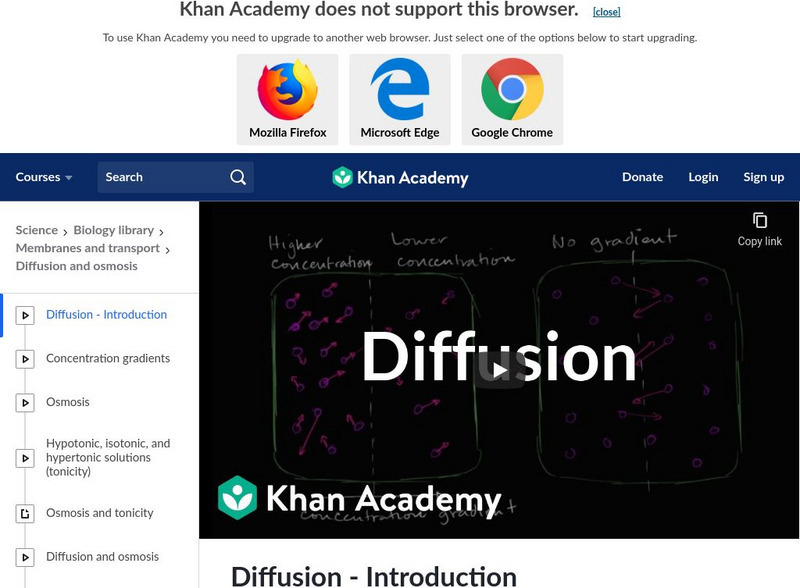Fuse School
Diffusion of Gases
Phew, what's that smell? And, how does something like a scent travel from its source to all corners of a room? Science sleuths learn how diffusion is responsible for spreading odors around in the sixth installment in a 14-part video...
MinutePhysics
What is a Dimension? In 3D...and 2D...and 1D
How many dimensions are there? Latitude, longitude, and altitude are accepted dimensions, but what about time or another type of dimension? An engaging video describes how we theorize that we live in three dimensions and which laws of...
Bozeman Science
Waves
Calculating frequency is so easy it Hertz! The video begins by describing transverse and longitudinal waves, and then it explores their properties and applications. Finally, it applies this to the formulaic relationships between wave...
Crash Course
Circulatory and Respiratory Systems
Viewers follow the paths of oxygen and carbon dioxide through the human respiratory organs and the path of the molecules through the human circulatory system, in a short video about how the body delivers oxygen and picks up...
Crash Course
In Da Club - Membranes and Transport
Wouldn't it be great to learn about cells through osmosis? Introduce learners to the different mechanisms of active and passive transport with a video that shows how the different transports occur across the cell membrane,...
Crash Course
Passing Gases: Effusion, Diffusion and the Velocity of a Gas
We know that gases move throughout and out of our bodies, but why? And how? Learn about gas movement by analyzing rates of effusion. Additionally, watch an interesting precipitate reaction using gases to apply effusion, diffusion, and...
Amoeba Sisters
Osmosis: A Solute and Solvent Love Story
Learning through osmosis doesn't work, but learning about osmosis is simple. A biology video provides a clear explanation of osmosis through simple diagrams and explains the application of osmosis in multiple contexts.
Ricochet Science
Diffusion
Let's diffuse the situation. Delight learners with a video to introduce a new term. Show the quick clip to overview the definition of diffusion and provide a visual representation of the concept of diffusion.
Curated OER
The Carbon Cycle
Hear how carbon functions on our earth and the purpose it serves. The carbon cycle is illustrated with narration for your junior high or high school biologists. Global temperature increase is also included, though the clip cuts off...
Khan Academy
Khan Academy: Diffusion
A video lecture exploring diffusion. Understand how a concentration gradient causes molecules to move from an area of high concentration to low concentration without any energy expended. [6:07]
Khan Academy
Khan Academy: Passive Transport and Selective Permeability
Learn about the transport of molecules across the cell membrane in this video. Video discusses passive transport, like diffusion, across a selectively permeable membrane. [6:59]
Khan Academy
Khan Academy: Concentration Gradients
View this example showing how two different types of particles can move down their concentration gradients in opposite directions. [3:03]
Khan Academy
Khan Academy: Diffusion and Osmosis
Learn about diffusion, osmosis, and concentration gradients and why these are important to cells. [18:58]
NASA
Nasa: The Role of Microgravity in Scientific Research
View this video and discover the four main ways that particles, atoms, and molecules move in liquid. This video segment demonstrates what sedimentation, buoyancy-driven convection, diffusion, and capillarity are and how gravity impacts...
Khan Academy
Khan Academy: Biology: Diffusion and Osmosis
A detailed explanation of the processes of diffusion and osmosis. [18:59]
Khan Academy
Khan Academy: Gas Exchange: Fick's Law of Diffusion
Learn all of the different ways to maximize the amount of particles that diffuse over a short distance over time.
Sophia Learning
Sophia: Cell Transport
A narrated tutorial describing the three different kinds of cellular transport: diffusion, osmosis, and facilitated diffusion. Includes descriptive illustrations, analogies, and examples. [13:28]
Howard Hughes Medical Institute
Hhmi: Bio Interactive: Diffusion Across Membranes
Resource offers a great explanation and animation of the processes of active and passive transport across cell membranes.
Science for Kids
Science Kids: Experiment Videos: Diffusion of Food Coloring
A brief video explains and illustrates the process of diffusion. [0:39]
Sophia Learning
Sophia: Diffusion: Lesson 5
This lesson will explain how substances move across a cell membrane through the process of diffusion as well as discuss why this process is important in our bodies. It is 5 of 8 in the series titled "Diffusion."
Bozeman Science
Bozeman Science: Specular Reflection
In the following video Paul Andersen explains how light that is perfectly reflected creates specular reflection. The angle of the incident ray is equal to the angle of the reflected ray. Specular reflection is also known as mirror-like...
Crash Course
Crash Course A&p #31: Respiratory System, Part 1
So we all know that breathing is pretty important, right? Today we're going to talk about how it works, starting with the nameless evolutionary ancestor that we inherited this from, and continuing to the mechanics of both simple...
Khan Academy
Khan Academy: Gas Exchange: Graham's Law of Diffusion
Find out whether oxygen or carbon dioxide has a higher rate of diffusion in this video lecture. Lecture discusses the euqation to find out how to relate diffusion of gases to their molar masses. [8:56]























